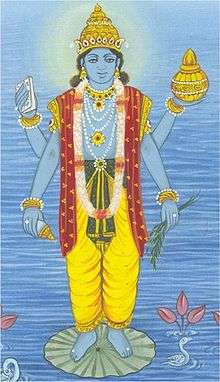Dhanteras
Dhanteras (Hindi: धनतेरस), also known as Dhanatrayodashi (Sanskrit: धनत्रयोदशी), is the first day that marks the festival of Diwali in India.
| Dhanteras | |
|---|---|
| Type | Religious, India and Nepal |
It is celebrated on the thirteenth lunar day of Krishna Paksha (dark fortnight) in the Hindu calendar month of Kartik. Dhanvantari, who is also worshipped on the occasion of Dhanteras, is considered the God of Ayurveda who imparted the wisdom of Ayurveda for the betterment of mankind, and to help rid it of the suffering of disease.[1]
The Indian ministry of Ayurveda, Yoga and Naturopathy, Unani, Siddha and Homoeopathy, announced its decision to observe Dhanteras, as the "National Ayurveda Day", which was first observed on 28 October 2016.[2] Usually, Gujarati families will enjoy a meal of daal baath and malpura to ring in the new year.
Celebrations

Vasubaras marks the beginning of the celebration of Diwali festival. On Vasubaras, the Cow and her calf are worshipped. The Cow holds a very sacred place in the Vedic Mythology. Referred to as "Gau Mata", she is worshipped and nurtured with the utmost respect. "Gau Mata" and her Prasad "Pancha Gavya", or "Panchamrut", are frequently used in all Hindu celebrations. Vasubaras is followed by Dhanteras.
Dhanteras is the worship of lord Dhanvantari. Lord Dhanvantari, according to Hindu Mythology, emerged during Samudra Manthan, holding a Kalasha full of Amrit (an Ayurvedic herbal mix) in one hand and the sacred text about Ayurveda in the other hand. He is considered to be the Vaidya of Gods.
The festival is celebrated as "Lakshmi Puja" Which is performed in the evenings when lamps of clay (Diyas) are lit. Bhajan's devotional songs in praise of Goddess Lakshmi, are sung and "Naivedya" of traditional sweets is offered to the Goddess. A peculiar custom in Maharashtra exists where people lightly pound dry coriander seeds (Dhane in Marathi for Dhanatrayodashi) with jaggery and offer the mixture as Naivedya.
On Dhanteras, homes that have not yet been cleaned in preparation for Diwali are thoroughly cleansed and whitewashed, and Lord Dhanvantari, the god of health and ayurveda, is worshiped in the evening. The main entrance are decorated with colorful lanterns, holiday lights and traditional motifs of Rangoli designs are made to welcome the Goddess of Wealth and Prosperity. To indicate her long-awaited arrival, small footprint's are drawn with rice flour and vermilion powder all over the houses. On the night of Dhanteras, diyas (lamps) are ritually kept burning all through the nights in honor of Lakshmi and Dhanvantari.[3]
On this day, Hindus consider it as an extremely auspicious day to make new purchases, especially gold or silver articles and new utensils. It is believed that new "Dhan" (wealth) or some form of precious metal is a sign of good luck. In modern times, Dhanteras has come to be known as the most auspicious occasion for buying gold, silver and other metals especially kitchenware. The day also sees heavy purchases of appliances and automobiles.
On this night, the lights are set out every night both in the sky lamps and as offerings at the base of a Tulsi plant and also in the form of diyas, which are placed in front of the doorways of homes. This light is an offering to Yama, the Host of Death, to avert untimely death during the time of the Diwali festival. This day is a celebration aimed at increasing wealth and prosperity. Dhanteras engages themes of cleansing, renewal, and the securing of auspiciousness in the form of Lakshmi.[4]
In the villages, cattle are adorned and worshiped by farmers as they form the main source of their income.
Within India
In South India (especially Tamil Nadu), Brahmin women make 'Marundhu' which translates into medicine on the eve of Naraka Chaturdasi that is Dhanvantri Trayodashi. The Marundhu is offered during the prayer and eaten in the early morning on Naraka Chaturdasi before sunrise. In fact, many families handover the recipes of Marundhu to their daughters and daughter in law. The Marundhu is consumed to eliminate the imbalance of tridoshas in the body.
Significance
On the day of Dhantrayodashi, Goddess Lakshmi came out from the ocean of milk during the churning of the Sea. Hence, Goddess Lakshmi is worshiped on the day of Trayodashi.
According to a popular legend, when the devas and asuras performed the Samudra manthan (churning of the ocean) for Amrita (the divine nectar of immortality), Dhanvantari (the physician of the Gods and an incarnation of Vishnu) emerged carrying a jar of the elixir on the day of Dhanteras.[4]
Legends
An ancient legend ascribes the occasion to an interesting story about the 16-year-old son of King Hima. His horoscope predicted his death by snake-bite on the fourth day of his marriage. On that particular day, his newly-wed wife did not allow him to sleep. She laid out all her ornaments and lots of gold and silver coins in a heap at the entrance of the sleeping chamber and lit lamps all over the place. Then she narrated stories and sang songs to keep her husband from falling next day, when Yama, the god of Death arrived at the prince's doorstep in the guise of a serpent, his eyes were dazzled and blinded by the brilliance of the lamps and the jewellery. Yama could not enter the Prince's chamber, so he climbed on top of the heap of gold coins and sat there the entire night listening to the stories and songs. In the morning, he silently went away. Thus, the young prince was saved from the clutches of death by the cleverness of his new bride, and the day came to be celebrated as Dhanteras.[5]
The following day came to be called Naraka Chaturdashi ('Naraka' means hell and Chaturdashi means 14th). It is also known as ‘Yamadeepdaan’ as the ladies of the house light earthen lamps or ‘deep’ and these are kept burning throughout the night glorifying Yama, the God of Death. Since this is the night before Diwali, it is also called 'Chhoti Diwali' or Minor Diwali.
See also
- Ganesh – Hindu god
References
- Hope-Murray, Angela (2013). Ayurveda For Dummies. John Wiley & Sons. p. 10.
- "Dhanteras to be observed as National Ayurveda Day". Times of India. 30 September 2016. Retrieved 13 October 2018.
- Vera, Zak (February 2010). Invisible River: Sir Richard's Last Mission. ISBN 978-1-4389-0020-9. Retrieved 26 October 2011.
- Pintchman, Tracy (2005). Guests at God's Wedding: Celebrating Kartik among the Women of Benares. SUNY Press. p. 59.
- "Dhanteras 2017: How this auspicious occasion is celebrated, timings and tithi". TimesNow. 2017. Retrieved 13 October 2017.

